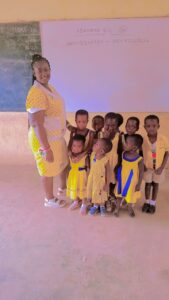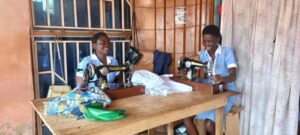
NADeF SCHOLARSHIP PROGRAMME: turning aspirations into achievements
The Newmont Ahafo Development Foundation (NADeF) scholarship scheme, launched in 2009, serves as a vital tool for empowering youth through education and vocational training.
With its focus on formal education and employable skills development, this initiative has become a beacon of hope and opportunity for the host communities of Newmont Ghana Gold Limited’s Ahafo South Mine and Ahafo North Project.
Newmont operationalized its Ahafo Mine in 2005, thereby, significantly diversifying the economy of Ahafo. Along this transition came opportunities for sustainable development. In response to these evolving dynamics, Newmont, in consultation with its ten host communities and other key stakeholders, established the Newmont Ahafo Development Foundation (NADeF) in May 2008 as its primary driver of corporate social responsibility.
The ten beneficiary communities are Kenyasi No.1, Kenyasi No.2, Ntotroso, Gyedu, Wamahinso, Yamfo, Susuanso, Afrisipakrom, Terchire, and Adrobaa in the Asutifi North District and Tano North Municipality. NADeF has seven thematic operational areas-Human Resource Development, Economic Empowerment, Social Amenities and Infrastructural Development, Cultural Heritage, Natural Resources Management, Sports, and Youth Development. NADeF is funded by a unique model that includes US$1 per ounce of gold produced and 1% of the mine’s annual profit after tax from the Newmont Ahafo Mine.
Prioritizing future development, NADeF allocates an impressive 28% of its total budget to human resource development initiatives- academic and apprenticeship scholarship scheme. By offering scholarships tailored to the unique needs of students under human resources development, the Foundation is cultivating a new generation of educated and skilled individuals who can contribute to the Ahafo region’s long-term growth.
In a significant milestone, 13,507 individuals have benefited from the academic scholarship of which 5,042 beneficiaries received support for senior high school prior to the free SHS introduction, while 7,062 were granted financial aid for tertiary education. The scholarship scheme is open to students across public and private tertiary institutions including universities, colleges of education, and health training institutions among others.
NADeF has, since 2017, suspended its scholarship support for senior high school (SHS) students. This decision was influenced by the introduction of the Free Senior High School (FSHS) policy by the government of Ghana, which aims to ease the financial burdens of secondary education.
The policy presented the opportunity for NADeF to re-define its focus in scholarship offerings by expanding the scheme to cover more tertiary students. Applicants who fail to meet the required cut-off grade of an aggregate score of 24 or better in their SSCE or WASSCE equivalents will be re-evaluated based on their improved academic performance in tertiary institutions. To qualify for reconsideration, students must achieve at least a second-class lower grade point average (GPA).
Under the apprenticeship component, 1,403 others have received support for vocational skills and apprenticeship trades. The vocational training includes welding and fabrication, hairdressing, dressmaking, auto mechanics, heavy-duty equipment training, videography, and baking, among others. These apprenticeship programmes, among others, serve as a catalyst for job creation and entrepreneurial opportunities within the local economy. Validated local residents-youth and master craftsmen (certified by professional body or association) in the communities qualify as apprentice, and master craftsman/woman under the programme.
Testimonies of Tertiary Education Beneficiaries
Felix Baffour Agyebinti, now a medical practitioner from Wamahinso in the Asutifi North District, embodies the positive impact of educational support. With the help of NADeF’s scholarship, he completed senior high school enroute to Kwame Nkrumah University of Science and Technology (KNUST) in Kumasi to study medicine. This scholarship played a crucial role in alleviating the financial strain on his family, enabling him to acquire essential study materials and medical tools without overwhelming stress.
There was a time when my younger siblings were admitted to senior high school, and their admission fees, along with my tuition fees for the year, were overwhelming. The support from NADeF was a relief for my parents. I can still remember the joy on their faces to this day,” he said. “As a scholarship recipient, it reminds me to strive for excellence in everything I do and to be a role model for the younger generation.”
The experience of receiving a scholarship has instilled in Agyebinti a profound sense of responsibility. He views his education as an opportunity to excel and serve as a role model for the next generation. Since graduating, he has dedicated over four years to serving at major Catholic health facilities in the Ahafo Region, including St. Elizabeth Hospital at Hwidiem and St. John of God Hospital at Duayaw-Nkwanta. His role extends beyond clinical duties as he actively engages in various health outreach programmes aimed at enhancing healthcare access and delivery.
From Adrobaa, a community in Tano North Municipality, Aisha Bukari’s story shines as a beacon of hope for single mothers navigating the complexities of life and education. At 30, Ms. Bukari juggles the responsibilities of raising three children while pursuing her dreams, a journey made possible through the NADeF scholarship.

Being the eldest of six siblings, she faced significant challenges after her secondary education at Acherensua Senior High School in 2009. With financial constraints preventing her from attending university for over a decade, her aspirations seemed out of reach. However, receiving the NADeF scholarship allowed her to enroll in a Diploma in Education programme at the University of Education, Winneba, through the Sunyani Distance Learning Centre.
The scholarship re-ignited Bukari’s ambition. While studying, she took up the role as an unprofessional teacher in a local private school, contributing to her family’s income and gaining vital experience in the classroom. “Thanks to the NADeF scholarship, I proudly stand as a trained teacher fulfilling my national service. I will soon pursue my bachelor’s degree—a dream I once thought was a mirage,” she stated.
Breaking Barriers Through Apprenticeship
In Kenyasi, 32-year-old Sandra Yiettey after completing her senior high school education in 2016, aspired to join either the military or Immigration Service, fueled by her desire to serve her community. However, three unsuccessful enlistment attempts left her dreams in a limbo.
As a mother of three, she faced pressing financial challenges. She established a food business, selling tuo zaafi, a nutritious Ghanaian dish, which provided crucial support for her family. Yet, her ambitions extended beyond cooking; she was eager to venture into welding and metal fabrication. Unfortunately, financial limitations hindered her access to necessary training.
A breakthrough came in 2023 when she received NADeF apprenticeship scholarship to learn welding and metal fabrication. This opportunity has catalyzed her journey towards becoming a skilled tradeswoman. Ms. Yiettey is enthusiastic about addressing the gender disparities in male-dominated industries. “When a woman engages in a traditionally male dominated trade, she often becomes the preferred choice in society,” she noted.
Her ambition is not solely for personal advancement; she aims to empower young women, especially school dropouts, by providing them with valuable employable skills.
Upon completing my three-year apprenticeship, I plan to mentor the next generation of women in welding and metal fabrication to demonstrate that with determination and support, barriers can be dismantled,” she stated.
The story of 21-year-old Comfort Fordjour in Kenyasi exemplifies the transformative power of vocational training. After completing her Junior High School education in 2020, young Comfort initially pursued vehicle air conditioner repairs. However, her aspirations faced setback when her mentor and master craftsman abandoned her and other apprentices after 18 months, leaving them without guidance.

Fortunately, the NADeF apprenticeship scholarship intervened, providing her with a sewing machine and essential tools for dressmaking. This support not only relieved her family’s financial burden but also rekindled her passion for learning a trade. “The NADeF apprenticeship support is a dream come true for me,” she shared, highlighting how this opportunity has paved the way for a sustainable career.
Impact Assessment
Prof. Yaw Ofosu-Kusi, Chairperson of the Board of Trustees, NADeF said the scholarship scheme is revolutionizing educational opportunities for children in the ten beneficiary communities, enabling families to overcome financial obstacles that previously hindered their access to quality education.
The transformative nature of the scholarship scheme instills hope for future leadership within the communities. By removing financial barriers, the Foundation is paving the way for a generation poised to participate in decision-making processes,” he emphasized.
“The Apprenticeship Programme on the other hand equips young people with essential vocational skills. This initiative caters to those who may not thrive in traditional academic settings, providing them with hands-on training that translates directly into employment opportunities. The programme plays a crucial role in youth empowerment, enabling many to achieve financial independence and contribute positively to their families and communities,” Prof. Ofosu-Kusi added.
Sustainability of the scholarship scheme
As Newmont Ahafo Mines maintain their operations, NADeF is committed to enhancing academic and apprenticeship opportunities within the local community through its robust scholarship scheme. This initiative is part of a broader sustainability strategy aimed at ensuring that the benefits of Newmont’s operations at Ahafo extend well beyond economic metrics. NADeF’s scholarship programme is not merely short-term aid; it is a long-term investment in the communities’ future.
The Foundation allocates a percentage of its annual receipts to an Endowment Fund, guaranteeing the programme’s viability even after mining operations cease in the area. As of December, 2023 NADeF’s Endowment Fund investments stood at GH¢97.8 million. This forward-thinking approach secures educational support for generations to come.
The Ahafo North Project, expected to commence commercial operations in 2025, is set to significantly boost NADeF’s financial standing. The mine is projected to produce between 275,000 and 325,000 ounces of gold annually over its 14-year lifespan, translating into substantial contributions to the Foundation and its scholarship initiatives.
Conclusion
As NADeF evolves and broadens its impact, the potential for meaningful change in individual lives and the national development narrative is significant. Achieving sustainable rural community development is a collective effort, underscoring the importance of support systems like those offered by the Newmont Foundation (NADeF).

